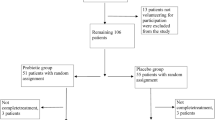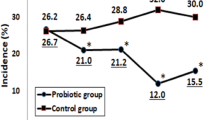Abstract
Fermented milk was used as therapy in infantile diarrhoea due to post-gastroenteritis syndrome. This treatment eliminated the disease in 4.0 days (mean value, SD=2.8; n=13) and allowed patients to return to free feeding according to their age. The weight percentile variation during treatment with fermented milk (15 days) was higher in the patients showing 3rd degree malnutrition than in other children. Bacteriotherapy can restore faecal flora which has been lowered by diarrhoea. Our results showed that levels higher than 106 UFC lactobacilli/g of faeces correlated with a healthy status of the children. Clinical applications of fermented milk with a mixture ofLactobacillus casei andLactobacillus acidophilus in the prevention of gastrointestinal disorders are possible.
Similar content being viewed by others
References
Norin KE, Gustafsson BE, Lindblad BS, Midtvedt T. The establishment of some microflora associated characteristics in feces from children during the first years of life. Acta Pediatr Scand 1985; 74: 207–12.
Weijers HA, Van de Kamer JH. Alteration of intestinal bacterial flora as cause of diarrhoea. Nutr Abstr Rev 1965; 35: 591–604.
Eiguer T, Ogawa K. Estudio bacteriológico del tracto gastrointestinal de niños eutróficos y desnutridos con diarreas agudas y crónicas. Arch Argent Pediat 1975; 73: 85–91.
Fernandes Custy F, Shahani KM, Amer MA. Control of diarrhea by lactobacilli. J Appl Nutr 1988; 40: 32–43.
Clements ML, Levine MM, Black RE, Robins Browne RM, Cisneros LA, Drusano GL, Lanata CF, Sach AJ.Lactobacillus prophylaxis for diarrhoea due toEscherichia coli. Antimicrobial Agents and Chemotherapy 1981; 20: 104–8.
Perdigón G, Alvarez S, Nader de Macías ME, Margni RA, Oliver G, Pesce de Ruiz Holgado A. Lactobacilli administered orally induce release of enzymes from peritoneal macrophages in mice. Milchwissenschaft 1986; 41: 344–8.
Perdigón G, Nader de Macías ME, Alvarez S, Pesce de Ruiz Holgado A. Systemic augmentation on the immune response in mice by feeding fermented milks withL. casei andL. acidophilus. Immunology 1988; 63: 17–23.
Perdigón G, Nader de Macías ME, Alvarez S, Oliver G, Pesce de Ruiz Holgado A. Prevention of gastrointestinal infection using immunobiological methods with milk fermented withL. casei andL. acidophilus. J Dairy Res 1990; 57: 255–64.
Perdigón G, Nader de Macías ME, Alvarez S, Oliver G, Pesce de Ruiz Holgado A. Enhancement of immune response in mice fed with S. termophilus and Lactobacillus. J Dairy Sci 1987; 70: 919–26.
Perdigón G, Alvarez S, Nader de Macías ME, de Giori SG, de Kairuz N. Behaviour of natural and heated yoghurt in the immune system and preventive capacity on enteric infections. Milchwissenschaft 1991; 46: 411–6.
Walker Smith JA. Cow milk intolerance a cause in postenteritis diarrhea. J Pedriatr Gastroenterol Nutr 1982; 1: 163–73.
Fernandes Custy F Shahani KM. Modulation of antibiosis by lactobacilli and yogurt and its healthful and beneficial significance. In: Chandan RC, ed. Yogurt: nutritional and health properties, 1989: 145–59. Proc. Internat. Yogurt Conf. New York Academy.
Shahani KM, Fernandes H, Amer V. Immunologic and therapeutic modulation of gastrointestinal microecology by lactobacilli. Microecology and Therapy 1989; 18: 103–4.
Fernandes Custy F, Shahani KM. Lactose intolerance and its modulation with lactobacilli and other microbial supplements. J Appl Nutr 1989; 41: 60–4.
González SN, Albarracín G, Locascio de Ruiz Pesce M, Male M, Apella MC, Pesce de Ruiz Holgado A, Oliver G. Prevention of infantile diarrhoea by fermented milk. Microbiologie-Aliments-Nutr 1990; 8: 349–54.
Apella MC, González SN, Nader de Macías ME, Romero NC, Oliver G.In vitro studies on the inhibition of growth ofShigella sonnei byLactobacillus casei andL. acidophilus. J Appl Bacteriol 1992; 73: 480–3.
Nader de Macías ME, Romero NC, Apella MC, González SN, Oliver G. Prevention of infections produced byEscherichia coli and Listeria monocytogenes by feeding milk fermented with lactobacilli. J Food Prot 1993; 56: 401–5.
Perdigón G, Alvarez S. Probiotics and the immune state In: Fuller R, ed. Probitic the scientific basis. London: Chapman and Hall, 1992: 146–76.
Raibaud P, Caulet M, Galpin JV, Mocquot G. Studies on the bacterial flora on the alimentary tract of pigs II. Streptococci: selective enumeration and differentiation of the dominant group. Appl Bacteriol 1961; 24: 285–91.
Zychowicz C, Surazynska A, Siewierska B, Cieplinska T. Effect ofL. acidophilus cultures (acidophilus milk) on the carrier state of Shigella and Salmonella organisms in children. Ped Pol 1974; 49: 997–1003.
Ielasi G, Caruso G, Pellizer GP, Dal Pra P. Sulla terapia delle salmonellossi. Cli Ter 1985; 113: 375–8.
González SN, Apella MC, Romero NC, Nader de Macías ME, Oliver G. Inhibition of enteropathogens by lactobacilli strains used in fermented milk. J Food Prot 1993; 56: 773–6.
Romero NC, Nader de Macías ME, Apella MC, Oliver G. Inhibition of Listeria monocytogenes by strains of lactic acid bacteria used as ferments. Microbiologie-Aliments-Nutr 1990; 8: 335–40.
Friend BA, Shahani KM. Nutritional and therapeutic aspect of lactobacilli. J Appl Nutr 1984; 36: 125–53.
Gurr MI. Nutritional aspects of fermented milk products. FEMS Microbiol Rev 1987; 46: 337–42.
Kato I, Yokokura T, Mutai M. Macrophage activation byL. casei in mice. Microbiol Immunol 1983; 27: 611–8.
Hashimoto S, Nomoto K, Matsuzaki T, Yokokura T, Mutai M. Oxygen radical production by peritoneal macrophages and Kuffer cells elicited withL. casei. Infect Immun 1984; 44: 61–7.
Perdigón G, Nader de Macías ME, Alvarez S, Pesce de Ruiz Holgado A, Oliver G. Effect of perorally administered lactobacilli on macrophage activation in mice. Infect Immun 1986; 53: 404–10.
Zoppi G, Deganello A, Benoni G, Saccomani F. Oral bacterio-therapy in clinical practice. I. The use of different preparations in infants treated with antibiotics. Eur J Pediatr 1982; 139: 18–21.
Author information
Authors and Affiliations
Rights and permissions
About this article
Cite this article
Gonzalez, S.N., Cardozo, R., Apella, M.C. et al. Biotherapeutic role of fermented milk. Biotherapy 8, 129–134 (1994). https://doi.org/10.1007/BF01878496
Received:
Accepted:
Issue Date:
DOI: https://doi.org/10.1007/BF01878496




